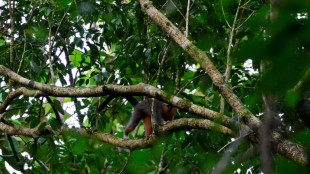Giant pandas flown to US from China aboard 'Panda Express'
Two giant pandas arrived at the Washington zoo on Tuesday in the latest chapter in China's campaign of international "panda diplomacy."
Bao Li, a male panda, and Qing Bao, a female, were flown from Chengdu to Dulles airport in Virginia aboard a FedEx Boeing 777F cargo plane dubbed the "Panda Express," the Smithsonian National Zoo said.
The three-year-old bears were then loaded on to trucks and taken to their new home at the zoo in the US capital.
"Bao Li and Qing Bao exited their crates and began exploring their new indoor enclosures, in which keepers placed ample bamboo for the bears to eat," a zoo statement said.
It said they will be quarantined for at least 30 days and will not go on public display until January 24, 2025.
"We're thrilled to welcome Bao Li and Qing Bao to Washington," said Brandie Smith, director of the National Zoo and Conservation Biology Institute. "Today we joyfully celebrate a new chapter of our 52-year-long giant panda breeding and conservation program."
Only a few of the beloved black-and-white bears remain in the United States after almost all were returned to China in recent years under pre-arranged contracts -- including all three of the National Zoo's pandas last November.
The lack of immediate replacements was viewed by many as a symbol of the heightened tensions between Washington and Beijing.
China has been using so-called "panda diplomacy" since 1972, when the first animals were sent to Washington as a gift, following US president Richard Nixon's historic visit to the Communist nation.
Chinese President Xi Jinping said after meeting his counterpart Joe Biden at a summit in California last November that China could send new pandas as "envoys of friendship between the Chinese and American people."
In August, the San Diego zoo welcomed two new giant pandas, the first to be sent by China to the United States in 21 years.
Renovations have been undertaken at the National Zoo's panda habitat "to enhance the safety of the facilities and maximize space for the bears to roam," according to the zoo's website.
The new structures constructed for the pandas include shallow pools to allow them to bathe and bamboo stands that require the bears to mimic the foraging techniques they would use in the wild.
A popular Giant Panda Cam will be relaunched once the bears make their public debut in January.
T.Cortez--RTC



